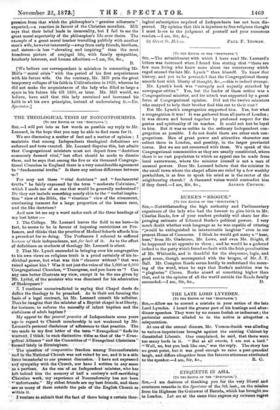[ To THE EDITOR OF THE SPECTATOR.")
SIR, —The astonishment with which I have read Mr. Leonard's letters was increased when I found him stating that "there are few men living who know more about the controversy which raged around the late Mr. Lynch" than himself. To know that history, and yet to be persuade I that the Congregational theory accords best with liberty of thought, &c.,—this is indeed strange.
Mr. Lynch's book was "savagely and unjustly attacked by newspaper critics." Yes, but the leader of these critics was a Congregational minister, and his attack was supported by a great force of Congregational opinion. Did not the twelve ministers who essayed to help their brother find this out to their cost?
But Mr. Lynch's congregation supported him. Yes, but what a congregation it was! It was gathered from all parts of London ; it was drawn and bound together by profound respect for the genius and spirituality of its teacher. It could not but be loyal to him. But it was as unlike to the o rdinary Independent con- gregation as possible. I do not doubt there are other such con- gregations. Men of great power and attractive character can collect them in London, and possibly, in the larger provincial towns. But we are not concerned with these. We speak of the Congregational communities as they are usually constituted, where there is no vast population to which an appeal can be made from local narrowness, where the minister himself is not a man of unusual powers. Does Mr. Leonard believe that the minister in the small town where the chapel affairs are ruled by a few wealthy pewholders, is as free to speak his mind as is the rector of the neighbouring church ? A thousand voices would contradict him


































 Previous page
Previous page